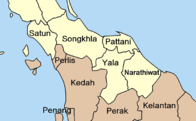21 dead in south Thailand attacks
Friday, June 1, 2007
In one of the deadliest days of the south Thailand insurgency, 21 people have died in attacks, including 12 soldiers who were killed by a roadside bombing and ambush attack on Thursday night. Elsewhere the same evening, gunmen attacked a mosque and killed seven people, and two other deaths were being reported elsewhere.
"This was the biggest single attack yet," Royal Thai Army spokesman Colonel Akara Tiprote said of the bombing and ambush on the soldiers. He described the day's death toll of 21 as "shocking."
The attack on the troops came at around 10 p.m. local time (1600 GMT) on Thursday, when a pickup truck carrying 12 Royal Thai Army soldiers was hit by a remote-control bomb planted at the roadside. An unknown number of gunmen then ambushed the truck, and shot each soldier in the head. Eleven soldiers were killed instantly, and the remaining injured soldier died at hospital on Friday.
The soldiers were returning from Pattani, where they had been on crowd-control duty at a protest by around 2,000 Muslim students and local residents, who are calling for the repeal of an emergency decree by the Thai government, and for soldiers to be withdrawn from the southern provinces. The protest continued for a second day on Friday.
In another incident on Thursday night, five people were killed and two injured when gunmen fired at a mosque in Saba Yoi, Songkhla. "The victims were all men in their 20s," Akara was quoted as saying by the Bangkok Post. "They were killed inside the mosque."
The injured two victims of the mosque attack also died in hospital on Friday, and two other deaths from violence were reported in the southern provinces on Thursday, bringing the day's death toll to 21.
Akara said the mosque attack was an attempt to further destabilize relations between citizens and the central government.
"The insurgents opened fire on the Muslim villagers and put the blame on the authorities," Akara was quoted as saying by the Associated Press. "They want to create an impression that authorities cannot take care of the Muslim people in the area. Worse still, they want people to think the authorities did it to poison the relationship between the government and the local population."
The past year in southern Thailand has seen an escalation in separatist attacks, with almost daily fatal shootings of civilians and frequent ambushes on soldiers. Three weeks ago, seven soldiers were killed in an ambush in Narathiwat.
On Sunday, 12 people were injured and one killed in a series of bombings in the city of Hat Yai. The next day, four people were killed when a bomb-laden motorcycle exploded at a crowded market in Saba Yoi. Six men were arrested on Thursday in connection with Sunday's bombings.
Since early 2004, more than 2,200 people have been killed, mainly in the Muslim-majority southernmost provinces of Yala, Pattani and Narathiwat. Thailand is predominantly a Buddhist country, but in those three provinces, the majority of residents are Muslim.
"The militants have stepped up attacks in order to increase pressure on authorities," Akara was quoted as saying by Agence France-Presse.
Prime Minister Surayud Chulanont said on Friday there would be no retaliation. "We must be patient ... we have to be firm on the rule of law. We will not do anything to cause more problems and injustice," he said.
Army Chief General Sonthi Boonyaratglin, chairman of the junta's ruling Council for National Security, who is Muslim, said he would visit the south in an effort to calm tensions. His visit would also include meeting with student protest organizers at Pattani's main mosque.
Related news
edit- "Bomb tossed at southern Thailand hotel; victim of Sunday blast dies" — Wikinews, May 29, 2007
- "Four killed, dozens injured in southern Thailand bombings" — Wikinews, May 28, 2007
Sources
edit- "21 killed in worst day of violence yet" — The Nation (Thailand), June 1, 2007
- "Tensions rise after deadly strike in Thailand's south" — Agence France-Presse, June 1, 2007
- "Violence in Thailand Leaves 18 Dead" — Associated Press, June 1, 2007
- "Grim night in South" — The Nation (Thailand), June 1, 2007
- "16 die in tit-for-tat South attacks" — Bangkok Post, June 1, 2007
- "Six held for Hat Yai bombings" — Bangkok Post, June 1, 2007
- Thai News Agency. "Army death toll rises in Yala; Muslim protest continues in Pattani" — MCOT, June 1, 2007
- Thai News Agency. "Thai Army chief to visit deep South to defuse tension at Pattani mosque rally" — MCOT, June 1, 2007
- Thai News Agency. "10 soldiers killed in Yala; 5 villagers shot in Songkhla mosque" — MCOT, May 31, 2007
- "Ten soldiers killed in Thai blast" — BBC News Online, May 31, 2007
- Thai News Agency. "Police detain six Hat Yai bombing suspects" — MCOT, May 31, 2007
- "Five detained in connection with latest Hat Yai bomb attacks" — The Nation (Thailand), May 31, 2007
